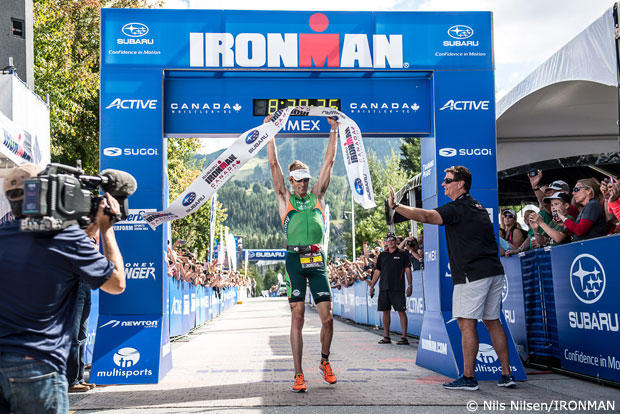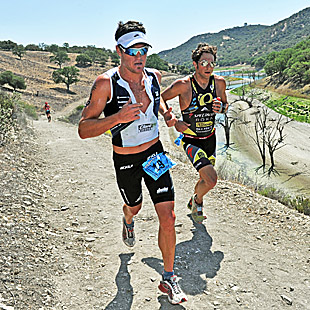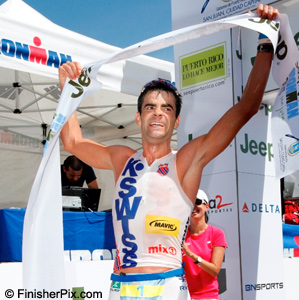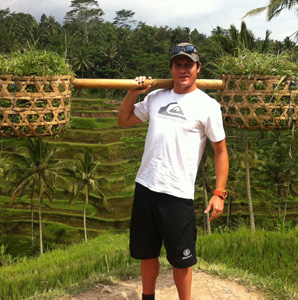Back on the winning track
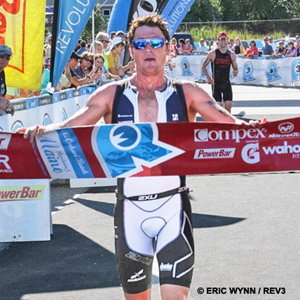
After winning the 2006 ITU Duathlon World Championship, Leon Griffin has had a career filled with many ups and downs, punctuated by discouraging injuries and spectacular recoveries. In 2008 he won three 70.3s and the Australian long course title followed by three podiums at 70.3 races in 2009. In 2010, he took 2nd at Geelong 70.3 but an Achilles injury wiped out the rest of the year and he and wife-to-be Merridee returned to Australia where he took a job in the finance industry. After winning Shepparton 70.3 late in 2011, Griffin married Merridee and decided that a full time job plus elite triathlon training was wearing him down. So he quit the job to return to racing full time.
The 2012 season proved to be a success as he emulated Angela Naeth’s long string of 70.3 runner-up finishes, including 2nd places at Urban Hotels Long Course in Geelong, Ironman 70.3 San Juan, Ironman 70.3 Timberman and at the Wildflower Long Course this past May. Then another injury struck — a gluteus medius tear kept him out of action for two months and a slow recovery left him off form in his first two return outings.
But once again, Griffin proved that the man from Kangaroo Flat cannot stay down. Last weekend he prevailed in a race-long duel with David Thompson to win the Olympic distance Rev3 Maine triathlon. Which gives him renewed confidence he can contend at the Ironman 70.3 World championship in Las Vegas September 8.
Slowtwitch: How long has it been since you’ve won a substantial race? Where was it and when?
Leon Griffin That’s stretching my memory back a bit. In November 2011 I won the Ironman 70.3 in Shepparton, just a stone’s throw from my home in Oz. In between, I think I’ve been the runner-up bridesmaid at no less than half a dozen other events, so it’s a nice feeling to break that duck of seconds.
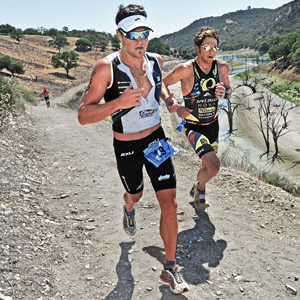
ST: You started well this year, but you were held up by some physical woes. What was bothering you?
Leon: For most of this US season, I’ve been dogged by a tear in my gluteus medius, which I picked up racing Wildflower.
ST: How did that injury occur?
Leon: There are some gnarly descents on that Wildflower run course, and I think all the over-striding trying to keep pace with the long-legged Jesse Thomas I just overdid it.
ST: What did you do to cure it?
Leon: It took me 6 weeks of on again-off again training before I took a few smart peoples advice and sought the opinion of the very well renowned physical therapist here in Boulder – Bob Cranny. He immediately diagnosed the problem, and told me I had two choices: to take significant time off, or run near flat-out every run session for a few weeks to take the strain off the area by keeping better run form. I chose the latter.
ST: Meanwhile how were you going in the races you were able to do?
Leon: My first race back was Ironman 70.3 Mont Tremblant for a 9th place, and a few weeks later Ironman 70.3 Racine for a 6th. Very mediocre indeed but I was at least back on the ballpark.
ST: When you were going through those difficulties, how did you keep your spirits up?
Leon: It’s always hard when you endure lengthy periods of forced downtime. I was so, soo close to packing up my wife and belongings and heading home again to rejoin the workforce. Triathlon is hard enough to make a living from when you are racing quite regularly, let alone not racing. This is the first time my wife and I have gone all-in. Merridee quit her job back in Australia as a New Home’s salesperson, and without her income to fall back on, the tougher times are even tougher.
ST: When did you finally return to A1 shape?
Leon: I’m still far from A1 shape. More like A2 or B1. I’ve only had two good run weeks in the past 4 months, so I’m encouraged by hopefully what’s to come later in the season — if I can keep on the track and get some nice consistency in the training.
ST: What made the difference in getting you back to top shape?
Leon: One of my strengths has been the rebound in form I can get from a few short weeks of nice miles. It’s like riding along on a high speed rollercoaster…when injured my form can plummet quickly (I gain weight like you wouldn’t believe) and vice versa when I get back injury free and super motivated to climb back to where I left off pre-injury.
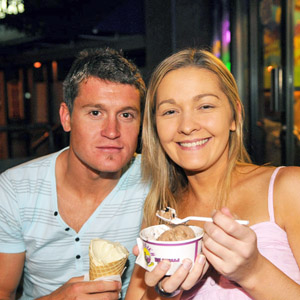
ST: You suffered an Achilles injury in 2010, returned to Australia and got a job in the financial industry and struggled with combining a 40-hour work week and 30-hours-a-week training. When did you make up your mind to give triathlon a full go again?
Leon: That was after the win at Shepparton 70.3 late in 2011.
ST: How did those next races go?
Leon: Pretty terrible first up. Busselton Ironman was a disaster, but I was still working at that point. I competed at the Geelong 70.3 two days after I walked out of the office for the last time and had an encouraging 2nd place. Then another 2nd place at San Juan 70.3 and a 4th at the always-stacked Oceanside 70.3, so I was feeling pretty happy about my decision.
ST: What was working well? And what more did you need to work on?
Leon: I did some local bike racing while I was working, so my bike was actually pretty good coming in off the bench. Running was OK but my swimming had gone back to being dreadful. I just didn’t work on that weakness while working at the Bank because all my swimming had to be at 5:30am before I got to the office…and I’m just not an early morning person.
ST: What was your first satisfying race back?
Leon: I think it was San Juan 70.3. I took a massive risk financially getting from Australia to Puerto Rico. I could have done my lot right then and there, but I doubled my money and so I was away. I thought, ‘Let the adventure begin!’
ST: Can you take me through this year’s races – what race gave you the most encouragement and why?
Leon: I finished 4th at the Urban Hotel Long Course Geelong (70.3) and that gave me a lot of encouragement. My swim was still off, and couldn’t get going on the bike, but I out-split the winner (Chris Kemp) on the run and he’d also just touched up an amazing field at the Asia-Pacific 70.3 Champs a few weeks earlier, so I knew I wasn’t far off a big one. Ironman Melbourne was a total disaster. Then at Wildflower I matched Jesse Thomas for 10 miles on the run and [finished 2nd] beat home compatriot Joe Gambles that day. Those two guys are very good yard sticks, some of the best in the business, so my tail was up.
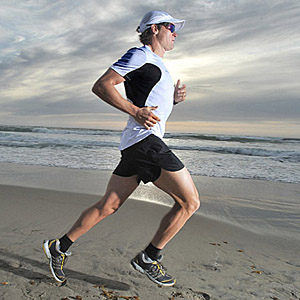
ST: You had a tough day at Boulder 70.3, a home race. What happened there and how did you come back from that?
Leon: That was my first mechanical [DNF] in maybe 5 or 6 years, so it was probably due some bad luck. I jumped on my bike at the mount line a little too aggressively (maybe it was the excitement of making the front pack swim again) and jammed my wheel into the frame and couldn’t get it turning; I eventually got that fixed and just a few more miles down the road my Di2 went flat — maybe I forgot to charge the battery? So my day frustratingly ended early. I went home and sulked for few hours, then jumped in the car and drove up to Boulder’s infamous Magnolia Road to blow off a bit of steam and ran for a few hours clearing the head. I was more determined than ever to make sure the next few races were a success.
ST: Your friends say you are finally back at full powers.
Leon: No – I still have plenty of room for improvement. Trust me!
ST: Coming into Rev3 Maine, how optimistic were you?
Leon: I was actually pretty bullish. I know I was an underdog, not having done anything of note in the Olympic distance for a while, but I was hungry. I saw the start list a few days out, and without disrespecting any of the guys, I thought I could match them all if I was feeling good on the day.

ST: Take us through your race where you had a duel with the famed Minnesota cyclist/triathlete David Thompson.
Leon: I’ve had some great battles with Dave in the past but haven’t raced him for a while, but I was keenly aware of his solid list of results the past year or two. He got a small jump on me out of T1, and I just knew he was the one to follow and navigate through the age group waves that were ahead of us during the first 5k on the bike. We quickly rounded up [Eric} Limkeman and [Matt] Leto and before we knew it our group of four had a handy lead at the turnaround. Thompson and Limkeman were happy to smash it out at the front, so I just hung back the legal distance and with the Timberman 70.3 fatigue still in my legs from the week before, I knew I had to save my pennies for the run.
ST: Coming into the run, you were a few seconds down to David. Were any other rivals near?
Leon: Dave had a ripper transition and was out like lightning. Limkeman and Leto also made me look pedestrian in T2 and before I knew it I was 20 secs back running out. I got those two before the first mile was out, pulled up to Dave at bit past the 1 mile mark and hit him immediately. He responded to a few surges I threw in, so I decided to wait till the last mile. Hit him again with 1 mile to go and he responded. Hit him with 600 to go and he hit me back and I thought it was all over. Then he ran into the cop with 500 to go and who then staggered into me also. With 200 to go I let loose and I don’t think David had anything else in the tank because he didn’t really respond. Either that or he was still dazed and bemused from crash tackling the police officer!
ST: What were you thinking as you crossed the finish with a win?
Leon: Phew! I can afford to furnish the new place my wife and I are moving into in a couple of weeks!
ST: Did you exchange a few words with David?
Leon: He was as he always is – gracious and a great sport and congratulated me for winning.
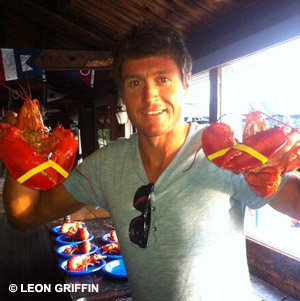
ST: Where did you find that lobster?
Leon: Our amazing homestay Jeff and Kim Cole knew where to get the best Maine Lobster to celebrate.
ST: How did it taste?
Leon: Very nice. Maybe the best I ever had. But then I can count on one hand the amount of times I’ve had lobster.
ST: Was Merridee with you? If not, did you bring back some lobster for your beautiful gal?
Leon: Yes – Merridee has been everywhere with me this year, tasting both the highs and lows. I don’t think I could do it without her amazing support. She makes my job very easy — I train, eat and sleep, and she takes care of everything else.
ST: What did this race mean for you and your sponsors?
Leon: I think it may have provided some welcome relief to any new sponsors I had. You always go in promising the world and till the past fortnight I hadn’t shown much at all this year. I think any sponsors that have been on board for a while know that at the end of the day it all evens out for me and there are good patches to go with the not so good patches.
ST: Are you back to 2006 form?
Leon: I don’t think so…I think the glass is half full.
ST: Might you be dangerous at Las Vegas?
Leon: I’m not real sure. Most triathletes train themselves into top shape…I guess I’m trying to buck the trend and race myself into shape. I trained really hard last year and had a dreadful race. This year I’m taking the ‘whatever happens happens’ approach and we’ll see how that pans out.
ST: What made the biggest difference in your return to near top form?
Leon: I think it’s got to do with being settled. Boulder and its altitude are not easy to just turn up and crank out the miles immediately and go blitz races. It takes a bit of time and patience and I feel like I’m getting into a good groove again.
ST: What leads you to seek a house in Boulder and braving the arctic winters?
Leon: I feel I perform my best when I’m settled and into a good groove. I just feel like packing up here in a month or so and going home will mean more weeks and months of being unsettled, then doing it all again next April coming back to Boulder. So my wife and I have decided it’s now or never. Boulder is truly a world-class high performance mecca and I want to tap into that. I want to do all the things over winter I don’t normally do. First and foremost will be a big break to regenerate, maybe a little skiing. I’ve never skied before.
ST: What new training might you do?
Leon: I want to spend some time doing gym work and strength and conditioning because I never have. I want to work extra hard on my weakness – swimming — for months on end without any racing interruptions because I’ve never really done that either.
ST: What is your new approach to your craft?
Leon: I remember Bradley Wiggins saying that he wanted to step out of the comfort zone, work on the things he was no good at so he can improve overall. Otherwise he’d just be the same old Bradley Wiggins. I feel the same way. If I keep doing the same old things Leon Griffin did in the past, I won’t change and improve. Only time will tell, I guess, if the gamble pays.


